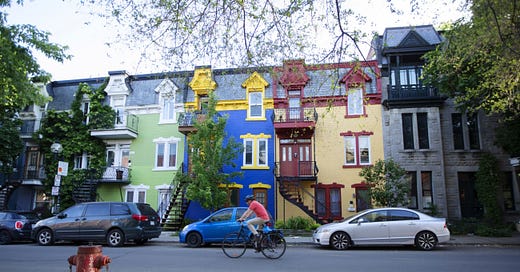Ahoy!
Weekly 3-2-1 here from Brick + Mortar on real estate, development, and creating great places:
3 things from others
2 things from me
1 picture
If you want to give a 👍, why not share?
3 THING FROM OTHERS
I.
If you liked the Culdesac Tempe show-and-tell last week, you’ll love Cully Grove in Portland, Oregon.
Self-proclaimed as a “solar-powered garden community,” Cully Grove offers amenities often tied to single-family living. In fact, it is a 16-unit condo development that incorporates community activities, a common house with guest rooms, bike storage, craft space, and even a pocket farm.
All on less than 2 acres. That’s 8.7 du / acre for the zoning gurus out there.
Source: Cully Grove website
II.
The Montreal plex is making a resurgence. Once deemed “The Poor Man’s Coffin,” the stock of two and three-story row houses now embodies the charm of the historic city and dominates the rental market. Far from the monotonous prefabs being built south of the border, perhaps we can all pull a little inspiration from Montreal’s eclectic sense of design.
Source: The Plexes of Montreal Make Room for Change
PS - they should have just called this article Montreal’s New Plex Flex. Much catchier.
III.
Gotta love a little municipal hypocrisy!





2 THING FROM ME
I.
You’ve got to admire zoning folk and their unflinching tenacity towards parking requirements.
If I had applied that level of determination in college, surely I would’ve been able to graduate a few years early. Or at least on time. A good lesson for the kids out there.
Parking is almost like a religion. You just don’t debate it in public. Both sides are so dug in that you quickly relapse into throwing F bombs across the aisle in a last-ditch effort to win the argument. But, in the end, everyone loses. Except Big Auto, that is.
In an almost ironic twist, some progressive cities have started pushing the needle forward by removing (or at least reducing) parking minimums. And, boy, if the Liberals are pushing for less-restrictive government oversight, there must be a good reason.
Did someone say they’re letting the market dictate the number of parking spaces? Now that’s a new one.
But, by god, if the collective goal is to get to better, walkable cities and towns, it’s about damn time.
Parking requirements artificially perpetuate our reliance on cars. It’s time to move on.
II.
Should form follow function? Or should function follow form?
It really just depends on what you’re trying to justify. The former if it’s 1896 and you’re Louis Sullivan trying to sell the world on its first skyscraper. And the latter if it’s 2021 and you’re me trying to sell my town on why housing density shouldn’t matter.
OK. Wait. Let me… just… jump up here on my soap box for a second.
We do all know why zoning exists, right? Aside from being used as a tool to enforce systemic racism (check out exclusionary zoning if you don’t already know), it’s also supposed to preserve the character of a municipality’s built environment.
It just so happens that this is largely done today by segmenting cities and towns into different zones where some uses are permitted and others aren’t. Or by capping the dwelling units per acre, floor-area ratios, and other arbitrary restrictions (like parking minimums!).
But that’s just it—these are all arbitrary means to an end. Who’s to say there’s not a better approach to do preserve character? And in a more equitable manner that benefits everyone.
Instead, what if we just regulated form and let function follow naturally and uninhibited? Mandate setbacks and façade design (e.g. % window coverage, entryway, balconies, etc.), not whether someone wants to put four units or a cottage court in an R-1 zoned for single-family. Hell, let ‘em throw in a corner store! As long as the form fits into the context of the building’s surroundings, who cares?
That is, unless, zoning is still being used for those.. ahem.. ulterior motives.
1 PICTURE
I.
Describing the view in Braille so everyone can see.
📍 Naples, Italy
That’s it for today. Thanks for reading. If you haven’t yet, go ahead and subscribe here:
About me: I’m Jonah Richard, ex-Accenture Consulting and Columbia Engineering alum. I’m currently building Village Ventures, a real estate development and investment company focused on creating great places.
Follow me on Twitter for more things related to real estate, development, and creating great places.




